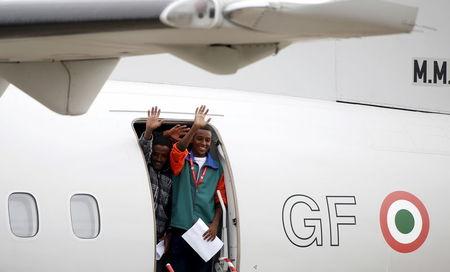Advertisement
Italy sends Eritreans to Sweden to seek asylum under EU plan
ROME (Reuters) - Italy sent a first group of Eritrean asylum seekers to Sweden on Friday as part of a European Union relocation plan aimed at easing the burden on border states amid the continent's biggest migration crisis since World War Two.
The 19 men and women who made a perilous journey across the desert and the sea to seek shelter in Europe lined up on the runway of Rome's Ciampino airport wearing light jackets, smiling and taking selfies before boarding a state plane.
European migration commissioner Dmitris Avramopoulos and Italian Interior Minister Angelino Alfano escorted them to the aircraft taking them to an airport near the Arctic Circle where temperatures dipped below freezing overnight.
More than half a million people have poured into Europe this year fleeing war and poverty in the Middle East, Asia and Africa, prompting bitter disputes between member states about how to react and how to share out the responsibility.
The EU plans to relocate a total of 160,000 refugees from the frontline states of Greece and Italy over two years.
"Today is a day of victory for Europe," Alfano told reporters as the jet lifted off the runway. Some 100 other asylum seekers will be sent to countries including Germany and Holland in coming weeks, he said.
Avramopoulos said the relocation was "a tangible example of what we can do if we work together" and urged EU states to deport migrants who do not qualify for asylum.
The transfer of asylum seekers was a key demand for Rome, which is under pressure from northern European states to keep migrants from absconding without being identified and repatriate those who do not qualify for asylum.
HOTSPOT
EU governments agreed on Thursday to step up deportations of migrants who do not qualify for asylum as the German state of Bavaria threatened to break ranks with Berlin and send back to Austria migrants who cross its Alpine frontier.
Avramopoulos will visit an immigration center that will be run jointly by EU and Italian officials - called a "hotspot" - on the Italian island of Lampedusa later on Friday before moving on to Greece to review its own "hotspot" plan.
Italy has said it is willing to increase deportations, but it will not build "concentration camps" to prevent them from continuing their journey to northern European countries. The EU made some 470,000 expulsion orders last year, but fewer than 40 percent of them were enforced.
Right now those who qualify for relocation are Syrians fleeing civil war, Eritreans escaping forced military service and Iraqis overrun by Islamic State militants.
Italy will be able to transfer 24,000 over two years under a voluntary relocation plan, and 15,600 under an obligatory transfer agreement. Almost 100,000 migrants are currently living in Italian immigration centers.
The EU budget will give 6,000 euros per head to the country that accepts the refugees, while the country that is transferring them will get 500 euros each to pay for their transfer.
(Additional reporting by Roberto Mignucci; Editing by Tom Heneghan)



















Add new comment